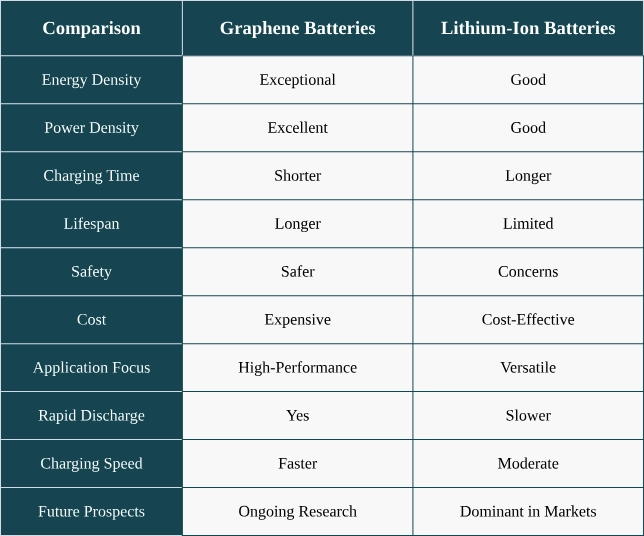
As we strive to power our gadgets, vehicles, and renewable energy systems, two promising contenders have emerged: graphene and lithium batteries. Both offer their own set of advantages and have the potential to revolutionize the energy storage industry. This article will delve into the composition and advantages of graphene and provide a detailed comparison of graphene and lithium batteries to determine which holds the upper hand in this electrifying competition.
Part 1. What is a graphene battery?
Graphene Battery Composition
A graphene battery is an energy storage device that incorporates graphene, a single layer of carbon atoms arranged in a honeycomb lattice structure. Graphene, known for its exceptional electrical conductivity and strength, is a critical component in these batteries. The battery typically consists of a graphene electrode, an electrolyte, and a second electrode of a complementary material.
Advantages of Graphene Batteries
Graphene batteries possess several notable advantages that make them an appealing alternative to conventional battery technologies:
- Fast Charging: Graphene batteries exhibit remarkable charge acceptance, enabling rapid charging. This feature is particularly advantageous in applications where quick recharging is essential, such as electric vehicles and portable electronics.
- High Energy Density: The energy density of graphene batteries is significantly higher than traditional lithium batteries. This characteristic translates into more stored energy per unit mass or volume, leading to extended device runtimes and increased efficiency.
- Enhanced Lifespan: Graphene’s exceptional durability and resistance to degradation contribute to prolonged battery lifespan. This longevity reduces the frequency of battery replacements, making it a cost-effective solution in the long run.
- Improved Safety: Graphene batteries are more stable and less prone to thermal runaway. This phenomenon can lead to fires or explosions in lithium batteries. This enhanced safety profile makes graphene batteries a compelling choice for various applications, including electric vehicles and energy storage systems.
- Environmental Friendliness: Graphene is a carbon-based material, and its use in batteries promotes environmental sustainability. Graphene batteries offer a cleaner and greener alternative to specific battery chemistries that rely on toxic elements.
Part 2. What is a lithium battery?
Lithium Battery Chemistry
Lithium batteries are rechargeable energy storage devices that employ lithium compounds as the primary material for one or both electrodes. These batteries utilize lithium ions that shuttle between the positive and negative electrodes during the charging and discharging. The most common type of lithium battery is the lithium-ion battery (Li-ion), widely used in portable electronics, electric vehicles, and renewable energy systems.
Advantages of Lithium Batteries
Lithium batteries have gained immense popularity due to their numerous advantages:
- High Energy Density: Lithium batteries are known for their impressive energy density, allowing them to store a significant amount of energy in a compact form. This characteristic makes them ideal for applications where size and weight are crucial factors, such as smartphones and laptops.
- Long Cycle Life: Lithium batteries exhibit a prolonged cycle life, meaning they can endure many charge-discharge cycles before experiencing a noticeable capacity degradation. This longevity ensures that lithium batteries maintain their performance over an extended period, reducing the need for frequent replacements.
- Lightweight Design: Lithium batteries are lightweight compared to other battery chemistries, making them particularly advantageous in portable devices. The reduced weight contributes to enhanced portability and convenience for users.
- High Discharge Rate: Lithium batteries can rapidly deliver a high amount of current, which is essential in applications that require bursts of power. This characteristic makes them suitable for electric vehicles, power tools, and other high-performance devices.
- Established Technology: Researchers have extensively studied and developed lithium batteries, resulting in a mature and well-established technology. This widespread adoption has led to economies of scale, making lithium batteries more affordable and accessible.
Part 3. Comparison of graphene and lithium batteries

Several key factors come into play when comparing graphene and lithium batteries. Let’s explore these factors to understand their relative strengths and weaknesses comprehensively.
- Energy Density: Graphene batteries exhibit a higher energy density than lithium batteries, giving them an edge in maximizing energy storage capacity.
- Charging Speed: Graphene batteries excel in fast charging capabilities, significantly outperforming lithium batteries regarding charge acceptance and reduced charging times.
- Lifespan: Graphene batteries have a longer lifespan due to their superior durability, making them a more reliable option for long-term use.
- Safety: While both battery types have advanced safety features, graphene batteries offer improved stability and reduced risk of thermal runaway, enhancing overall safety.
- Environmental Impact: Graphene batteries are considered more environmentally friendly as they rely on carbon-based materials and do not contain toxic elements, unlike specific lithium battery chemistries.
- Cost: Currently, graphene batteries are more expensive to manufacture than lithium batteries, mainly due to the challenges involved in large-scale production. However, as technology advances and economies of scale kick in, graphene batteries may become more cost-competitive.
- Maturity and Availability: The market has widely adopted lithium batteries, establishing mature infrastructure and supply chains for this technology. On the other hand, graphene batteries are still in the early stages of development and face scalability and commercial availability challenges.
- Application-Specific Advantages: One battery type may be advantageous depending on the specific application. For instance, graphene batteries are well-suited for fast-charging electric vehicles. In contrast, portable electronics users may prefer lithium batteries for their high energy density.
Part 4. Conclusion
Researchers will likely make further advancements in graphene and lithium battery technologies as technology evolves. These advancements will drive improvements in performance, cost-effectiveness, and scalability. Ultimately, the battle between graphene and lithium batteries will continue to shape the future of energy storage, providing us with increasingly efficient and sustainable solutions for our power-hungry world.
Part 5. FAQs
-
Why are graphene batteries not used?
Challenges in large-scale production, limited availability, and lack of infrastructure contribute to the restricted use of graphene batteries. -
What are the disadvantages of graphene batteries?
Disadvantages of graphene batteries include higher cost, difficulty in mass production, and scalability issues. -
Is graphene the future of batteries?
Graphene holds potential as a future battery technology due to its high conductivity and lightweight properties. -
Is graphene more expensive than lithium?
Graphene can be more expensive than lithium due to the complexities of production and processing. -
Can graphene replace lithium in batteries?
Graphene can complement or replace lithium in specific applications. Still, it is unlikely to replace lithium in all battery technologies entirely.
Related Tags:
More Articles
Overview of Deep Cycle Lithium Battery
In this article, we explore the life, voltage, capacity, and charging considerations of deep cycle lithium batteries.
How Long do Lithium Batteries Last?
How long do lithium batteries last? we will explore the factors that influence the lifespan of lithium batteries and provide insights into their longevity.
How to Choose the Best LiFePO4 Battery?
Choose LiFePO4 batteries for superior performance, safety, and versatility in EVs, UPS, and backup power. This guide helps you make informed decisions.
Get 12v Lithium Car Battery As a Power Source for the Ride
Make the right choice for your vehicle's battery needs by installing a 12 volt lithium car battery. You will enjoy maintenance-free longevity with this change.



